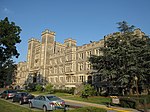Trinity Washington University
Trinity Washington University is a private university in Washington, D.C. affiliated with the Catholic Church. Trinity is a comprehensive university with five schools; the undergraduate College of Arts & Sciences maintains its original mission as a liberal arts women's college, while men attend Trinity's other schools at both the graduate and undergraduate level. The university was founded as Trinity College by the Sisters of Notre Dame de Namur in 1897 as the nation's first Catholic liberal arts college for women. Trinity was chartered by an Act of Congress on August 20, 1897. An elite institution in its early life, the college faced declining enrollment by the 1980s. It chose to begin recruiting local underprivileged students, and became predominantly black and Hispanic. Trinity became Trinity Washington University in 2004. Today, Trinity Washington University enrolls more than 1,800 students in its undergraduate and graduate programs in the College of Arts and Sciences, School of Nursing and Health Professions, School of Education, School of Business and Graduate Studies and School of Professional Studies. Trinity enrolls more District of Columbia residents than any other private university in the city and in the nation – more than half of Trinity’s students are residents of the D.C. Trinity’s student body in 2020 includes about 95% ethnic minorities, including about 65% Black/African American and 30% Latina/Hispanic. Trinity is designated by the U.S. Department of Education as a Minority Serving Institution and is the only university in the D.C. region, and one of only a few in the nation, designated as both a Predominantly Black Institution and Hispanic Serving Institution.
Excerpt from the Wikipedia article Trinity Washington University (License: CC BY-SA 3.0, Authors).Trinity Washington University
Franklin Street Northeast, Washington
Geographical coordinates (GPS) Address External links Nearby Places Show on map
Geographical coordinates (GPS)
| Latitude | Longitude |
|---|---|
| N 38.9275 ° | E -77.004872 ° |
Address
Trinity Washington University
Franklin Street Northeast
20018 Washington
District of Columbia, United States
Open on Google Maps








